  | | EU Commissioner Vălean takes member states to task |  |
|
| Adina Vălean, EU Transport Commissioner, has taken EU Member States to task for improvements in the rail system at the official opening event of InnoTrans. She wanted to ask the member states whether they were prepared to create ambitious market and technical legislation for more competition on the railways and to concentrate transport investments on the railways, said Vălean. Most recently, she said, some member states had simply accepted that their rail systems were performing poorly. EU subsidy programmes could not compensate for the lack of investment in the system in recent years. She called on the rail industry to build its capacity according to needs, to create standardised and affordable services. She called on transport companies to improve their services through innovation. In improving rail transport, she described herself as a "friend" of all stakeholders.
|
|
|
|
|
| |
 |
| | German Federal Minister of Transport Wissing: "Infrastructure is relevant to safety" |  |
|
| At the opening of InnoTrans, German Transport Minister Volker Wissing suggested that a reliable infrastructure should be included in the constitution as a national objective. In view of the war in Ukraine, he said, rail infrastructure is relevant to security: among other things, Germany is suffering from a shortage of gas and rising energy prices, and more and more fossil fuels have to be transported by rail. Weaknesses in the infrastructure are therefore "security gaps for the population". In front of the international audience, he also outlined the strategy with which Germany wants to renew its rail infrastructure: all necessary construction work on the heavily used main corridors is to be bundled and the corridors are to be completely closed one after the other. In return, they are to remain free of construction for many years. In addition to the infrastructure expansion, the digitalisation of the network should help to make better use of the existing infrastructure..
|
|
|
|
|
| |
 |
 | |  |
 |
| | Moving welcome address at the official start of InnoTrans |  |
|
| Probably few of the 1,000 guests invited to the official opening of InnoTrans yesterday in the Palais Berlin had expected this: Olexander Kamyschin, CEO of the Ukrainian railways, was also invited to speak. In a short but moving message of greeting, he addressed the audience personally. He emphasised the central role of his company in the war against the Russian aggressors. The railway made indispensable contributions, for example in the transport of refugees or wheat. In the meantime, 244 railwaymen had died in action. Kamyschin stressed that his country would continue to depend on foreign help in the war. And he thanked other European railway companies for their support. Deutsche Bahn, for example, had already organised refugee transports immediately after the war began. In addition, DB is helping with the delivery of relief goods. Deutsche Bahn CEO Richard Lutz assured that his company would continue to support Ukraine.
|
|
|
|
|
| |
 |
 | |  |
| | Get on track for Rail 4.0! |  |
|
| Looking for safe control technology for the rail transport of tomorrow? Visit us in Hall 27, Stand 550. We have the solution to keep you moving forward.
|
| » Further information
|
|
|
|
| |
 |
| | Industry representatives see focus on alternative drives and data ecosystem |  |
|
| 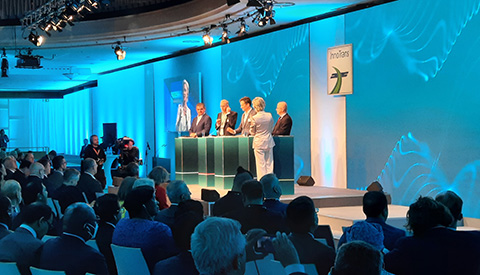 |
 |
At the panel discussion following the official opening of InnoTrans there was widespread agreement: Michael Theurer, Parliamentary State Secretary, Michael Peter, CEO of Siemens Mobility, Henri Poupart-Lafarge, CEO of Alstom and Peter Spuhler, Group CEO a.i. of Stadler, emphasised the importance of alternative drive systems for achieving climate targets. Peter Spuhler pointed out that the current service life of battery packs is only seven to eight years and that the efficiency of hydrogen drives is less than 30 percent. One of the great challenges of the coming years, according to the tenor, is to increase the efficiency of the railway system. Henri Poupart-Lafarge formulates a target of doubling passenger numbers and tripling freight volumes by 2030. Data collection and use in rail transport is another point where action is needed. According to Michael Peter, it is important to achieve harmonisation here. Michael Theurer referred to the Mobility Data Act, which is still to be drafted by the Federal Government and which, among other things, is to determine who owns the data, which "is not a trivial matter".
|
|
|
|
|
| |
 |
 | |  |
| | Europe's Rail presents new "Catalogue of Solutions” |  |
|
| The EU Innovation Partnership Programme Europe's Rail today launched its new "Catalogue of Solutions 2022". The first copy of the report was handed over by Managing Director Carlo Borghini to Transport Commissioner Adina Vălean. The catalogue lists 70 joint developments by members of the joint venture. They are intended to bring efficiency and innovation in the areas of passenger transport, traffic management, optimised infrastructure, digital "Mobility-as-a-Service" offers, freight transport and cross-cutting areas. Some developments are already ready for the market, others are still at the prototype stage. The previous edition of the report from 2019 - then still from the predecessor project "Shift2Rail" - included 54 solutions.
|
|
|
|
|
| |
 |
 | |  |
| | Increased service life with Vossloh’s M-Generation |  |
|
| We have turned our tension clamps upside down. Discover how you benefit from this at the Vossloh booth 975, in hall 26 & in the Vossloh Topic Lounge.
|
| » Further information
|
|
|
|
| |
 |
| | The Vectron gets faster |  |
|
|  |
 |
Up to now, 200 kilometres per hour was the limit - in the future, 230 will be possible. Siemens has "accelerated" its Vectron locomotive. The Czech state railway ČD has ordered 50 locomotives for international passenger transport - with a full service contract for 15 years. Registration is to take place in six countries: Czech Republic, Germany, Austria, Poland, Slovakia and Hungary. And as an option, approval for Denmark is also to follow, ČD said at the InnoTrans. The railway company wants to convert the EC trains Prague - Berlin - Hamburg to new carriage material - the ČD-Railjet - with the new Vectron till 2025. The locomotive will be equipped with Siemens' own ETCS Trainguard 200, which is specified for the European Train Control System ETCS Level 2 Baseline 3R2. In addition, the national Class B safety systems will be installed. Compared to the previous Vectron locomotives, Siemens has only had to make a few adjustments apart from the gear ratio. These primarily concern the running gear (dampers, motor suspension).
|
|
|
|
|
| |
 |
 | |  |
 |
| | Hydrogen and battery are topics at InnoTrans |  |
|
| 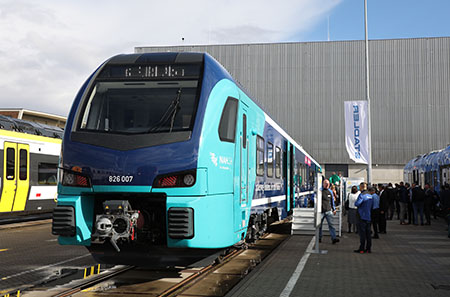 |
 |
Hydrogen drives using fuel cells are one of the major themes at InnoTrans. For regional transport alone, two trains will be shown that are designed according to different concepts. Stadler shows the Flirt H2, the first hydrogen train for the USA. This is not a prototype, however, but a series-production vehicle, according to Ansgar Brockmeyer, Head of Sales and Marketing. What is special about the train, he said, is the application of the technology: The entire hydrogen technology is housed in the centrally located "power car" - the passenger areas in the end cars, which correspond to the electric Flirt, are free of H2 technology. The Siemens Mireo Plus H is different. This train has the hydrogen technology installed from the roof of a train largely identical to the electric Mireo. The Stadler Flirt H2 is scheduled to run in California from 2024, where it is expected to cover the required 500 kilometres a day without refuelling, even in very hot weather and thus with high output for the air conditioning system. Battery drive is also an option for making regional trains locally emission-free. Stadler presented the new Flirt battery together with the client Nah.SH (Nahverkehrsgesellschaft Schleswig-Holstein). The vehicle can run under overhead line or with the battery. The first of the 55 trains ordered will go into passenger service in May 2023. This means that around 40 percent of the services in Schleswig-Holstein's regional transport will then be provided by battery trains.
|
|
|
|
|
| |
 |
| | Consortium will sell hydrogen-powered vehicles and hydrogen in sets |  |
|
| 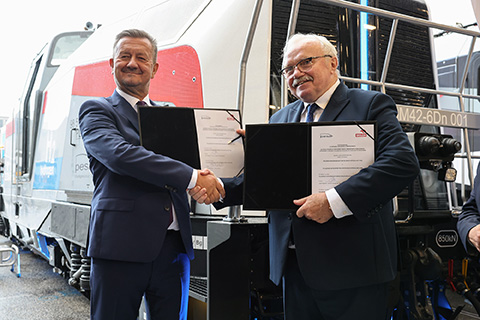 |
 |
Polish rail vehicle manufacturer Pesa and Polish oil company and refuelling station operator PKN Orlen signed an agreement at InnoTrans on Tuesday to cooperate on hydrogen-powered rail vehicles. In a joint consortium, the two companies will develop an offer for rail transport companies that includes the supply of rolling stock together with hydrogen supply and refuelling solutions. The agreement is a clear signal to the market that the rolling stock produced by Pesa has an assured supply of hydrogen, said Krzysztof Zdziarski, president of Pesa. For PKN Orlen, the agreement is part of its hydrogen strategy: by 2030, the group plans to invest around 7.5 billion Polish Złoty (around 1.6 billion Euro), so that almost half of the hydrogen produced by the company will then be low-emission and emission-free, emphasised Daniel Obajtek, chairman of the board of PKN Orlen. Pesa and PKN Orlen jointly presented a hydrogen shunting locomotive with a mobile filling station on the open-air site. The shunting locomotive will complete the final approval tests on the line in Żmigród after InnoTrans and is expected to go into operation at the PKN Orlen production plant in Płock in the first quarter of 2023.
|
|
|
|
|
| |
 |
 | |  |
| | Berlin's new e-buses come from Ebusco |  |
|
| The Dutch manufacturer Ebusco is showing the all-electric city bus 3.0 (photo) in the Bus Display at InnoTrans. The Model 2.2, the new E-bus for the Berlin Transport Authority (BVG), is located in front of the north entrance. The first of a total of 90 vehicles was presented in the capital at the end of August. The e-buses are 12 metres long and offer space for around 70 passengers (35 seated). The batteries of the depot chargers have a usable energy content of 419 kilowatt hours, which, according to the manufacturer, allows them to travel 290 kilometres without intermediate charging. Peter Bijvelds, managing director of Ebusco, is looking forward to the days of InnoTrans. The trade fair offers the opportunity to exchange ideas with colleagues from the industry and to present their own products.
|
|
|
|
|
| |
 |
| | New braking systems from Knorr-Bremse, Liebherr and Siemens Mobility |  |
|
| 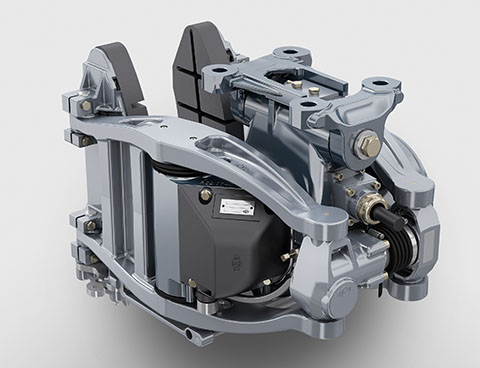 |
 |
In contrast to conventional pneumatic braking systems, the electromechanical brake (EM brake, photo) from Knorr-Bremse generates and transmits the braking signal and energy purely electrically. Due to the faster application and release, braking distances are shortened and track capacities are increased. With reduced and simplified mechanical and electrical interfaces, the EM brake enables the "airless train" - a train without a complex system of compressors, compressed air tanks and pipes or hydraulics. Siemens Mobility has also developed a new braking technology with Liebherr. It will be used for the first time at the end of 2022 in the "X-Wagen" metro project in Vienna (Austria). An essential component of the airless braking system is the electrohydraulic brake actuator, which Siemens Mobility and Liebherr developed together. This actuator converts the braking force for the system. In contrast to the conventional compressed-air brake, the brake is controlled completely electrically. This "brake-by-wire" system makes all compressed air lines and pneumatic components for brake control superfluous.
|
|
|
|
|
| |
 |
 | |  |
 |
| | Saudi Arabian Railway Company pushes ahead with major rail project |  |
|
| 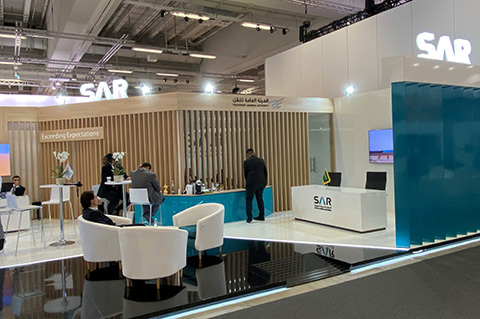 |
 |
Saudi Arabia is pursuing ambitious plans for the expansion of its railway system - and is also making progress with this at InnoTrans. His country has already signed contracts with Deutsche Bahn and Siemens, said Dr Bashar Khalid Al Malik, CEO of the Saudi Arabian Railway Company (SAR), in an interview with InnoTrans Daily. The project with DB is about knowledge transfer, among other things, and the project with Siemens is also about ticketing. SAR plans to announce further details shortly. Saudi Arabia plans to expand its railway system considerably by 2030. The rail network is to be extended by 8,000 kilometres from the current 5,000 kilometres. Freight transport is to more than triple from the current 18 million tonnes annually to 60 million tonnes. In addition, there are plans to significantly increase passenger numbers. With the expansion plans, Saudi Arabia wants to position itself as a hub in the region and diversify its economy more strongly. Dr. Khalid Al Malik explained that they are still looking for potential partners to implement the plans.
|
|
|
|
|
| |
 |
| | MES Expo at InnoTrans |  |
|
| The supplier industry plays an important role at InnoTrans and so MES - Mobility Electronics Supplier Expo 2023 is also represented with its own stand (Hall 10.1, Stand 400). Guided tours on the topic of electrical engineering in the mobility industry start daily at 11 a.m. at the stand. Prior registration for this is not required. MES Expo is the international trade fair platform for the electronics supply industry in the mobility sector. After 2019 and 2021, it will take place in 2023 from 7 to 9 November at the Berlin Exhibition Grounds. In addition to the exhibition from the Automotive Technology, Utility Vehicle Technology and Railway Technology sectors, it offers an extensive supporting programme for exchanges between trade visitors and industry experts.
|
|
|
|
|
| |
 | | | Important dates on 21st September 2022 |
| |
|  |
| | • | 10.00 - 12.00 Rethink Mobility: Innovation paths to a new era of intelligent climate solutions, German Railway Industry Association (VDB), palais.Berlin |
| • | 10.00 - 13.30 From the passenger experience to connected vehicle - co-innovation for successful mobility solutions! CityCube Berlin, Level 3, M1-3 |
| • | 14.00 - 16.00 Automated in the future - rail traffic in Germany on a higher level, German Transport Forum (DVF), palais.Berlin |
| • | 14.00 - 16.00 Tunnel renewal during operation, CityCube Berlin, Level 3, M8 |
| • | 15.00 - 16.00 Ramboll - Next stop climate neutrality – sustainable change in rail mobility Germany’s urban rail projects, Hall 15.2, Speakers' Corner |
|
| You can find all events at InnoTrans Plus
|
|
|
|
| |
 | | | InnoTrans Daily on the road |
| |
|  |
| The InnoTrans Daily is also available for download in the InnoTrans Report app and online at www.innotrans.com.
|
|
|
|
|
| |
| We are publishing an exclusive World Innovation Guide to coincide with InnoTrans 2022. The guide presents world innovations from the five trade fair segments Railway Technology, Railway Infrastructure, Public Transport, Interiors and Tunnel Construction, which have never been seen before by trade visitors at any event.
|
| |
|
|
|
| |
 | | | InnoTrans Exhibition Grounds |
| |
|  |
|
| Editor
Messe Berlin GmbH
Business Unit MS Mobility & Services
Messedamm 22, 14055 Berlin
Amtsgericht Charlottenburg, HRB 5484 B, represented by the management: Martin Ecknig (chairman), Dirk Hoffmann
Chairman of the Supervisory Board: Dr. Eric Schweitzer
Ust.-IdNr.: DE 136629714
T +49 30 3038 2376
F +49 30 3038 2190
innotrans@messe-berlin.de
www.innotrans.com
|
Concept and editing
DVV Media Group GmbH I Eurailpress
Heidenkampsweg 73-79, D-20097 Hamburg
Tel.: +49 (0) 40 237 14-260
HRG Hamburg, A 89498,
UST-IdNr.: DE 177 996 643, Geschäftsführer: Martin Weber
Managing editor: Marion Frahm
Editorial team: Barbara Feldmann, Julius G. Fiedler, Georg Kern, Christoph Müller, Dagmar Rees, Miriam Riedel, Jennifer Schacha
Editorial management Messe Berlin: Ingrid Mardo
|
|
| |
|
|
|